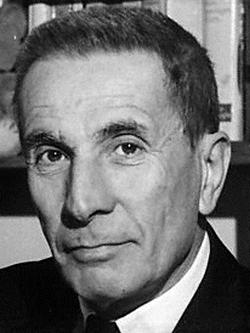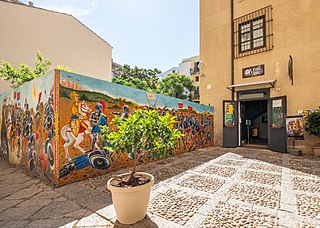Fortunato Pasqualino | |
|---|---|
 Pasqualino in Radiocorriere magazine (1973) | |
| Born | 8 November 1923 |
| Died | 14 September 2008 (aged 84) Rome, Italy |
| Occupation | Writer |
Fortunato Pasqualino was an Italian novelist, philosopher, playwright and journalist.
Fortunato Pasqualino | |
|---|---|
 Pasqualino in Radiocorriere magazine (1973) | |
| Born | 8 November 1923 |
| Died | 14 September 2008 (aged 84) Rome, Italy |
| Occupation | Writer |
Fortunato Pasqualino was an Italian novelist, philosopher, playwright and journalist.
Born into a poor family in Butera, Sicily, Pasqualino left the school at 10 years old to work as a laborer in orange groves; as an adolescent he reprised his studies, first as an autodidact and then with the help of some teachers, and was able to get a Liceo classico diploma. [1] After the war he graduated in philosophy at the University of Catania, and moved to Sardinia where he worked as a professor of philosophy, pedagogy and psychology. He later was employed at RAI, where he worked as a journalist, a television writer and occasionally as a presenter. [1]
He started his literary activity in the late 1940s, and after several philosophical works he got his breakout in 1963 with the autobiographical novel Adamo in Sicilia ("Adam in Sicily"), which won a Flaiano Prize and was finalist at the Premio Campiello. [1] [2] [3] Other important works were Diario di un metafisico ("Diary of a metaphysician", 1964), a compendium of philosophical reflections in a narrative form, and The little Jesus of Sicily (Il giorno che fui Gesù, literally "The day I was Jesus", 1977). [1] [2] In 1978 he won the Flaiano Prize for the stage play Socrate baccante ("Socrates Bacchante"). [1] [4] His last book was Chiunque tu sia. Con Gesù a passo d’asino ("Whoever you are. With Jesus at donkey pace", 2005). [1]
Always interested in the Opera dei Pupi, a theatrical genre he treated in several books, [2] in 1968 he founded and directed with his brother Giuseppe an Opera dei Pupi theatre in Trastevere, Rome, which was active until the early 1990s. [1] He was also a collaborator of newspapers and philosophical and literary magazines, and a professor of philosophy of entertainment at the Pro Deo University. [1]

Umberto Eco was an Italian medievalist, philosopher, semiotician, novelist, cultural critic, and political and social commentator. In English, he is best known for his popular 1980 novel The Name of the Rose, a historical mystery combining semiotics in fiction with biblical analysis, medieval studies and literary theory, as well as Foucault's Pendulum, his 1988 novel which touches on similar themes.

Dino Buzzati-Traverso was an Italian novelist, short story writer, painter and poet, as well as a journalist for Corriere della Sera. His worldwide fame is mostly due to his novel The Tartar Steppe, although he is also known for his well-received collections of short stories.

Maurizio Costanzo was an Italian television host, journalist, screenwriter, and film director.

Daniello Bartoli, SJ was an Italian Jesuit writer and historiographer, celebrated by the poet Giacomo Leopardi as the "Dante of Italian prose"

Giovanni Carmelo Verga di Fontanabianca was an Italian realist (verista) writer, best known for his depictions of life in his native Sicily, especially the short story and later play Cavalleria rusticana and the novel I Malavoglia.
Marco Leonardi is an Italian actor.

Giovanni Papini was an Italian journalist, essayist, novelist, short story writer, poet, literary critic, and philosopher. A controversial literary figure of the early and mid-twentieth century, he was the earliest and most enthusiastic representative and promoter of Italian pragmatism. Papini was admired for his writing style and engaged in heated polemics. Involved with avant-garde movements such as futurism and post-decadentism, he moved from one political and philosophical position to another, always dissatisfied and uneasy: he converted from anti-clericalism and atheism to Catholicism, and went from convinced interventionism – before 1915 – to an aversion to war. In the 1930s, after moving from individualism to conservatism, he finally became a fascist, while maintaining an aversion to Nazism.

Lucio Dalla was an Italian singer-songwriter, musician and actor. He also played clarinet and keyboards.

Ennio Flaiano was an Italian screenwriter, playwright, novelist, journalist, and drama critic. Best known for his work with Federico Fellini, Flaiano co-wrote ten screenplays with the Italian director, including La Strada (1954), La Dolce Vita (1960), and 8½ (1963).

Gianni Celati was an Italian writer, translator, and literary critic.

Roberto Pazzi was an Italian novelist and poet. His works have been translated into twenty-six languages. He was widely recognized in Italian literary circles for his poetry and novels. His Debut novel, Cercando l'Imperatore in 1985, received a number of international awards and started a prolific career of historical and contemporary novels.
Giovanni Maria Cornoldi was an Italian Jesuit academic, author, and preacher.
Vincenzo Consolo was an Italian writer.
Nazzareno Camilleri (1906–1973) was a Maltese philosopher, theologian, and mystic. His areas of specialisation in philosophy were chiefly metaphysics and pedagogy.

The Opera dei Pupi is a marionette theatrical representation of Frankish romantic poems traditionally performed in Sicily, Italy.
Amara Lakhous is an Italian author, journalist and anthropologist of Algerian origin. He currently lives in New York City.

Gaspare Canino was an Italian artist and one of the last puppetmasters of the Canino family, working in Alcamo in the province of Trapani; his activity, interrupted in 1970, has been resumed in 1990 by Salvatore Oliveri, his grandson.

The Antonio Pasqualino International Puppet Museum of Palermo operates in the field of national and international, traditional and contemporary puppetry.

Mimmo Cuticchio is an Italian cantastorie, puppeteer, actor and playwright.